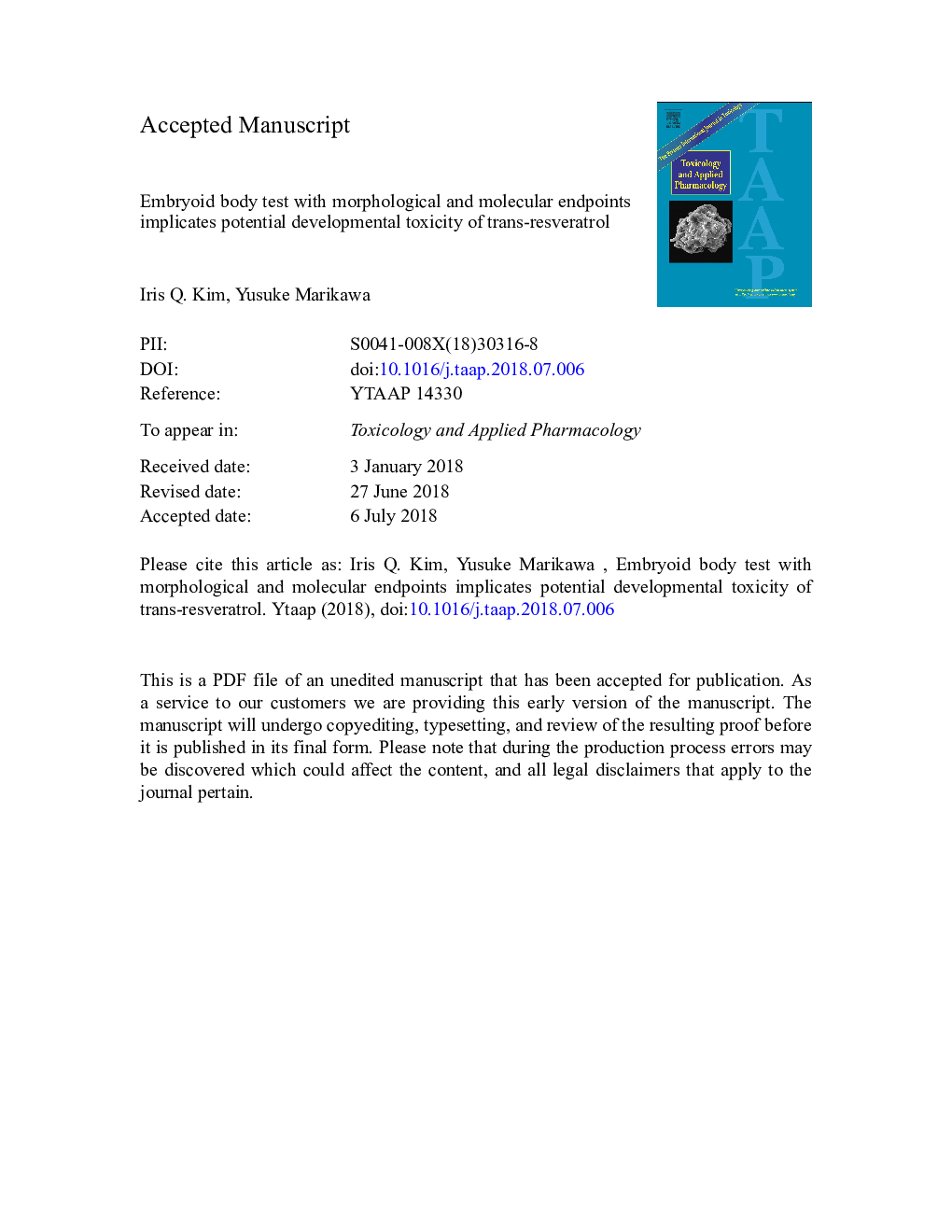| کد مقاله | کد نشریه | سال انتشار | مقاله انگلیسی | نسخه تمام متن |
|---|---|---|---|---|
| 8538150 | 1561107 | 2018 | 51 صفحه PDF | دانلود رایگان |
عنوان انگلیسی مقاله ISI
Embryoid body test with morphological and molecular endpoints implicates potential developmental toxicity of trans-resveratrol
ترجمه فارسی عنوان
تست بدن از نظر ایمنی بدن با نتایج مورفولوژیکی و مولکولی نشان دهنده سمیت بالقوه رشد و نمو ترانس رزوراترول
دانلود مقاله + سفارش ترجمه
دانلود مقاله ISI انگلیسی
رایگان برای ایرانیان
کلمات کلیدی
موضوعات مرتبط
علوم زیستی و بیوفناوری
علوم محیط زیست
بهداشت، سم شناسی و جهش زایی
چکیده انگلیسی
Developmental toxicity of compounds, which women of reproductive age are exposed to, should be assessed to minimize the incidence of miscarriage and birth defects. The present study examined the potential developmental toxicity of resveratrol, a dietary supplement widely marketed with various health claims, using the P19C5 embryoid body (EB) morphogenesis assay, which evaluates adverse effects of chemical exposures on tissue growth and axial elongation. Resveratrol (trans isoform) impaired morphogenesis at 4â¯Î¼M and higher, creating smaller and rounder EBs, whereas cis isoform, and glucuronated and sulfonated metabolites did not. Trans-resveratrol also altered expression levels of developmental regulator genes involved in embryonic patterning, such as Wnt3a, Tbx6, and Cyp26a1. To investigate the mechanisms of trans-resveratrol action, the roles of estrogen receptor, sirtuin 1 (SIRT1), and DNA replication in EB morphogenesis were examined. Neither activators of estrogen receptors (diethylstilbestrol [18â¯Î¼M] and raloxifene [8â¯Î¼M]) nor activator of SIRT1 (SRT1720 [2.4-3.2â¯Î¼M]) caused morphological and molecular alterations that are comparable to trans-resveratrol (10â¯Î¼M). By contrast, a reduction in the DNA replication rate with aphidicolin (0.4â¯Î¼M) or hydroxyurea (40â¯Î¼M) created smaller and rounder EBs and altered the expression levels of Wnt3a, Tbx6, and Cyp26a1 in a manner similar to trans-resveratrol. Consistently, trans-resveratrol significantly reduced the rate of EdU incorporation in P19C5 cells. These results suggest that a reduction in the DNA replication rate is one of the mechanisms by which trans-resveratrol impacts EB development. This study provides mechanistic insight for further investigations on the developmental toxicity of trans-resveratrol.
ناشر
Database: Elsevier - ScienceDirect (ساینس دایرکت)
Journal: Toxicology and Applied Pharmacology - Volume 355, 15 September 2018, Pages 211-225
Journal: Toxicology and Applied Pharmacology - Volume 355, 15 September 2018, Pages 211-225
نویسندگان
Iris Q. Kim, Yusuke Marikawa,
